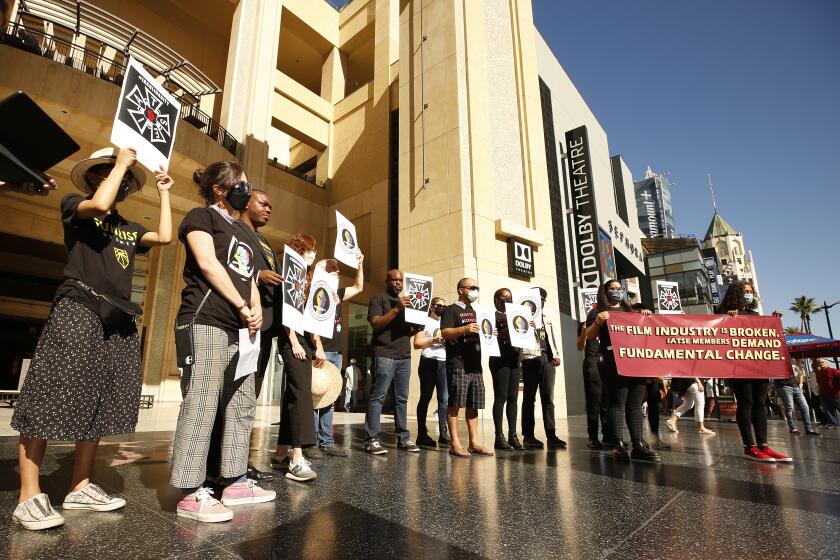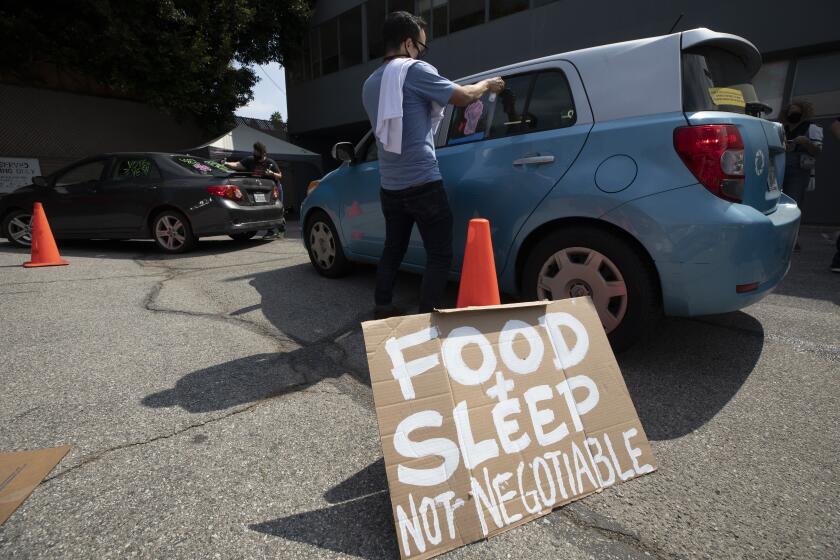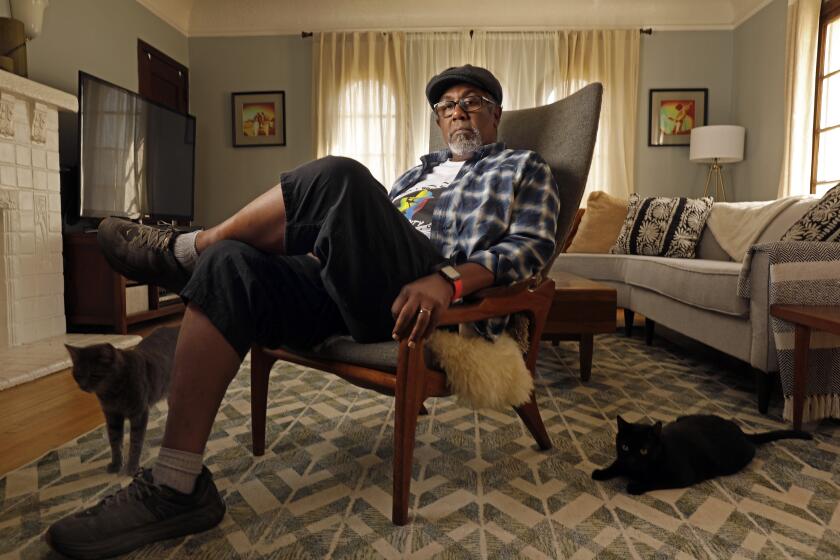Hollywood crew workers narrowly ratify new contracts with studios

- Share via
The union representing about 60,000 film and television crew workers has voted to ratify new three-year contracts with Hollywood studios, resolving for now a labor dispute that had threatened to disrupt productions nationwide.
Members of the International Alliance of Theatrical Stage Employees have barely approved new contracts negotiated by union leaders after months of contentious bargaining, IATSE said in a statement Monday.
For the record:
5:15 p.m. Nov. 15, 2021The contract includes a 10-hour minimum, not a cap, on turnaround time between shooting days.
However, the vote was extremely close: Only 50.3% of those who cast ballots approved the contracts covering West Coast-based workers and those outside New York and Los Angeles. Turnout was unusually high, with 72% of 63,209 members eligible to vote participating.
IATSE uses an electoral college-style system through which locals are assigned delegates based on their size of memberships. Members vote within their local, and once a local reaches a majority vote to either ratify or reject, all delegate votes are assigned to the majority result.
The combined delegate vote in favor of the contracts was 359 (56%) to 282 (44%), out of 641 total delegate votes from the 36 local unions. Notably, five of 13 West Coast-based locals covered by the so-called basic agreement voted against it — including Local 600, which represents camera crews; and Local 80, which represents grips. In the popular vote, a slight majority of members belonging to West Coast-based locals — 50.4% — rejected the agreement, underscoring deep divisions in the powerful union.
The results were being closely watched in Hollywood because IATSE supplies film and TV crews for productions from Los Angeles to Atlanta and New York.
Members of IATSE organized a press conference Thursday to highlight why they are voting against a proposed contract.
The approval caps an unusually tumultuous period for IATSE, whose leaders last month got an unprecedented endorsement from members to stage a walkout if they could not secure a new contract.
IATSE has traditionally avoided public confrontations with the major studios, but its members have grown increasingly restless, especially in the wake of the COVID-19 pandemic, which has increased pressure on crews to make up for lost time because of production shutdowns caused by the health crisis.
“From start to finish, from preparation to ratification, this has been a democratic process to win the very best contracts,” IATSE International President Matthew Loeb said in a statement. “The vigorous debate, high turnout and close election indicates we have an unprecedented movement-building opportunity to educate members on our collective bargaining process and drive more participation in our union long term.”
Although union ratification votes are typically a formality, ratification was not inevitable this time around. IATSE members had clashed over some aspects of the agreement.
The contracts contain various improvements, including giving crews 54 hours guaranteed rest when working five-day weeks, and wage increases in line with those of other unions. They also boost compensation for the lowest paid crafts and cover a $370-million deficit in IATSE’s health and pension plans, which faced higher costs during the pandemic.
But some members argued that the agreement did not do enough to improve working conditions and rein in long hours on sets, which has been a long-standing complaint among crews.
Last week, prop makers, sound engineers and other film set workers held a news conference in Hollywood to protest the new agreement and demand improved working conditions.
They cited the death of cinematographer Halyna Hutchins — who was fatally shot by a prop gun fired by actor-producer Alec Baldwin on the set of the western “Rust” — as an example of the risks they face in their workplaces. The death roiled Hollywood and renewed calls for safer sets.
Before Hutchins’ death, camera crews had complained to producers about long hours and unsafe working conditions, the Times reported.
The sharply differing points of view offer a window into the changing dynamics inside the union that represents camera operators, makeup artist, set decorators, editors, grips and others.
The new contracts — which include a 10-hour minimum for so-called turnaround times between shooting days — would still allow members to work 14-hour days, they noted. Critics also argued that the proposed 3% annual wage increase is less than the current rate of inflation.
Another sticking point: While the agreement includes improvements in pay from streaming companies, there was no increase to residuals that help fund the union’s health and pension plans.
Film crews are tired of tough working conditions and low pay from streaming companies and preparing to strike.
Other West Coast union locals that rejected the agreement were Local 728, which represents lighting technicians; the Motion Picture Costumers’ union, Local 705; and the Costume Designers Guild, Local 892, according to people familiar with the results who were not authorized to comment.
Loeb and other proponents, however, argued that it was a landmark deal that achieved many of the union’s long-held ambitions.
IATSE has been in talks with studios, represented by the Alliance of Motion Picture and Television Producers, since May. The alliance represents major studios including Walt Disney, WarnerMedia, Netflix and Amazon Studios.
“Throughout the negotiations, IATSE leadership advocated changes to improved quality of life for those they represent,” the alliance said in a statement. “These agreements meaningfully reflect the industry’s endorsement of those priorities and keep everyone working.”
The current three-year contract expired July 31 and was extended to allow more time, but talks fell apart in September, and IATSE called on members to approve a nationwide walkout for the first time in its history.
The voting was overseen by New York election management service Honest Ballot.
Inside the business of entertainment
The Wide Shot brings you news, analysis and insights on everything from streaming wars to production — and what it all means for the future.
You may occasionally receive promotional content from the Los Angeles Times.
More to Read
Inside the business of entertainment
The Wide Shot brings you news, analysis and insights on everything from streaming wars to production — and what it all means for the future.
You may occasionally receive promotional content from the Los Angeles Times.














